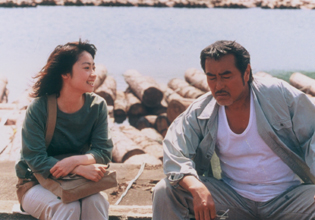Chicken is Barefoot
Azuma Morisaki
Japan 2003

|
" Delphi 08.02. 14.00 |
Produktion: Shima Film, Be Wild, Eisei-Gekijyo
Weltvertrieb: XANADUEX, 4B, Asamatsu Bldg.,
13-4 Rokuban-cho, Chiyoda-ku, Tokyo 102-0085
Tel.: (81-3) 3288-3300, Fax: 3288-3939
E-mail: info@xanaduex.co.jp
Buch: Kondo Shoji, Morisaki Azuma
Kamera: Hamada Takeshi
Musik: Uzaki Ryudo
Darsteller: Hijii Mika, Ishibashi Renji,
Hamagami Tatsuya, Yo Kimiko, Baisho Mitsuko
Format: 35mm, 1:1.85, Farbe
Länge: 114 Minuten, 24 Bilder/Sek.
Sprache: Japanisch
Maizuru, in the northern part of Kyoto. Isamu, a mentally disabled child living with his father, who works as a diver, has a photographic memory. He happens to memorise a set of accounts in a stolen Mercedes, which turn out to be an important piece of evidence in a bribery case involving a public prosecutor. Chased around the city by various elements of society, Isamu’s teacher Naoko and his father Mamoru venture out into the city of Maizuru to protect the child. Meanwhile, things begin to take unexpected twists and turns… The 24th offering from master filmmaker Morisaki Azuma, this film is a powerful work that can be viewed as the culmination of Morisaki’s consistent affection for the weaker members of society. Audiences will be riveted not only by the numerous twists and turns in the story, but also by the marvellous location filming, in which Morisaki makes maximum use of the varied landscapes of Maizuru, Kyoto. The cast is splendid, and includes Harada Yoshio and Baisho Mitsuko in their first appearance together since the renowned Nuclear Gypsies (1985). The title Niwatori wa hadashi da is a line uttered by Zaitsu Ichiro in Kuroki taro no ai to boken (Kuroki Taro’s Love & Adventure, made by Morisaki Azuma, 1977).
Morisaki Azuma, geb. 1927 in Nagasaki. Studium an der Universität von Kyoto. Seit 1956 als Drehbuchautor und Regieassistent in verschiedenen Studios tätig. Filmregie seit 1969, u.a. Heino naka no korinai menmen/Guys Who Never Learn, Onna sakasemasu/The Great Department Store Robbery (beide 1987), Yumenidori no hitobito (1989), Turibakanittushi special/Free and Easy Special Version (1994), Oishinbo (1996), Love Letter (1998).